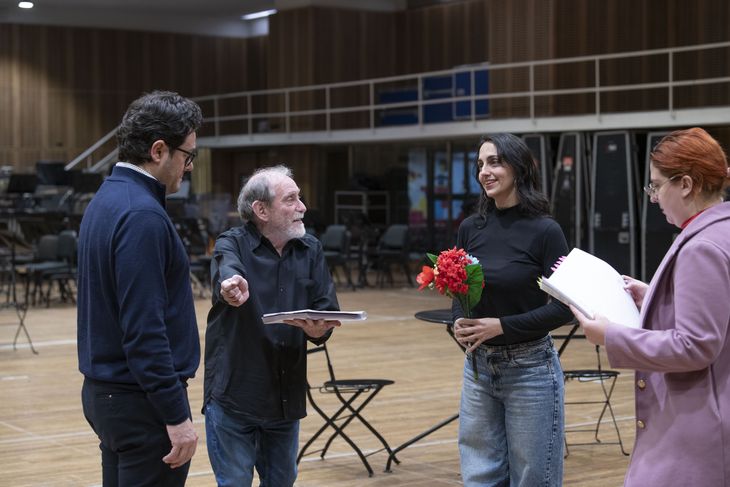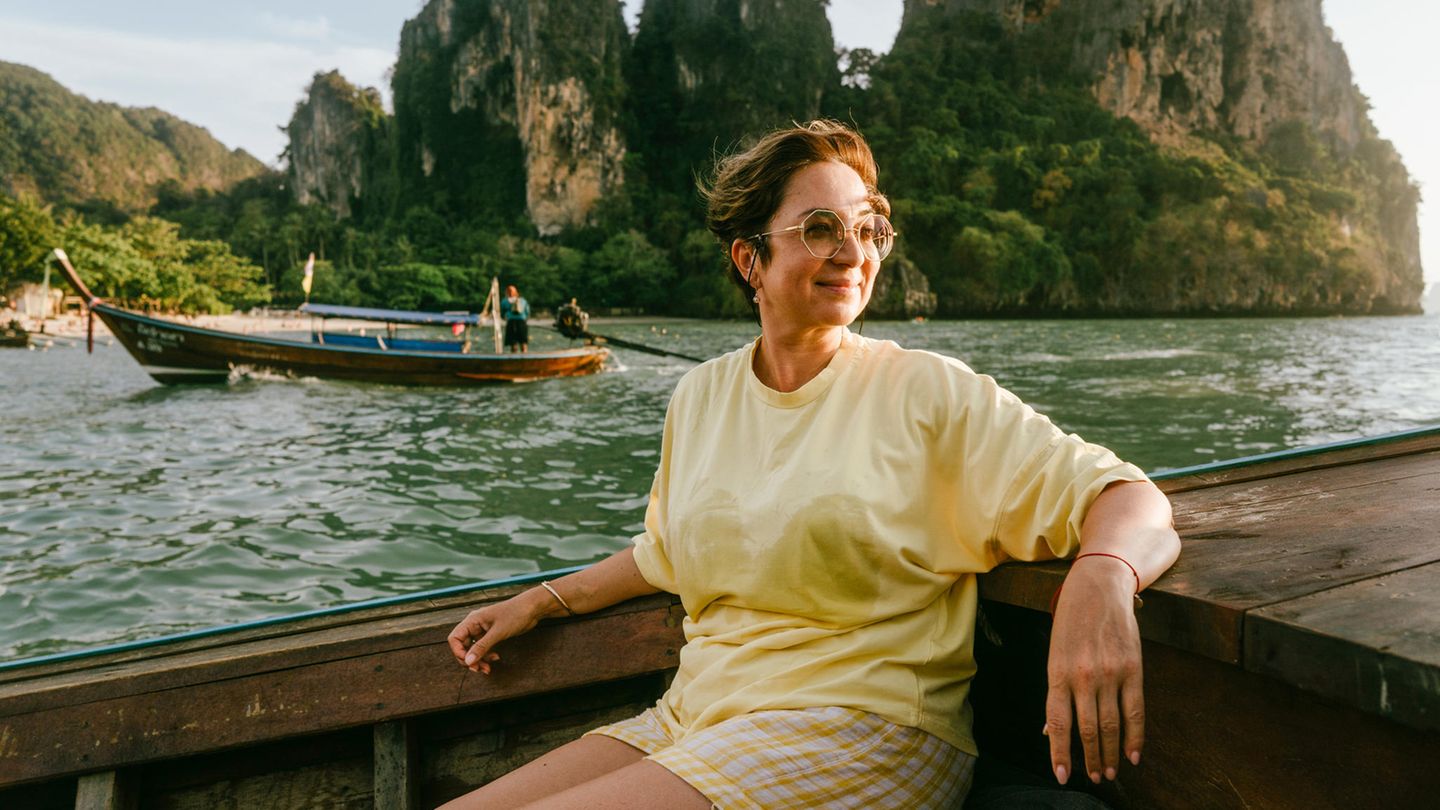“Since I was proposed to stage the ‘Werther’, it occurred to me that the best time to set it were the 30s of the last century”tells this newspaper Rubén Szuchmacherwho will be in charge of the Régie of the famous French opera of Jules Massenet that will be seen in the Colón Theater from next Sunday 24, at 17, depending on the evening.
In dialogue with Szuchmacherwho currently divides his time between the last essays of “Werther” And the future setting “La Gaviota” of Anton Chejov In the San Martín Theater (next month), we remind him that, months ago, talking justly about this setting, he had told us that he was going to guide for a kind of “Aesthetics to Manuel Puig in ‘Painted Boquitas’.”
Rubén Szuchmacher (Smile): Well, no, there are no explicit references to that work in this setting, but I can say that Puig’s work guided me to preserve the village in the epistolary novel of Goethe on which the opera is based, and that it is usually lost almost always in the traditional versions.
RS.: In principle, the characters dressed in the aristocratic style of the late eighteenth century distort the opera. Let’s keep in mind that in Europe there is a different tradition; Here, in this way, they give disguised, it is inevitable, and that puts a barrier with the public. “Werther” is an opera in whose setting, costumes and scenery, that precious temptation is usually fallen or, to be clearer, in the chantilly, and the truth is that in Massenet there is nothing like that. On the contrary, these versions do nothing but move the viewer away, especially the contemporary spectator, from the core of the “Werther” drama and his music.
Q.: And how did you work?
RS: The closest to a contemporary sensitivity, is a setting that dispenses with the tinsel, of limited visuality, a subtractive setting: there is only the fundamental thing; There are metal tables and chairs, there are no ramps or stairs. No need. In the last century, even in the early 90s, the public saw the setting where Alfredo Kraus sang, for example, and accepted that. Musically they were glorious versions, but the sensitivity of contemporary audiences has changed, luckily; I also listened to Victoria de los Angeles as Charlotte some years before.
Q.: Was Massenet away from Chantilly?
RS: Absolutely! The opera was released in 1892, more than a century after the appearance of Goethe’s novel. Moreover, already in Goethe himself it was not an aristocracy of a living room but a village, which is different. But in Massenet there are also great differences. In the novel, the young Werther dies of love, suicide for love. We are in full romanticism. On the other hand, in Massenet the Werther case is raised as a disease, it is something pathological, it is a depressive. It is much more modern. Staging the “Werther” has given me the opportunity to approach again, and now more deeply, to this extraordinary opera.
Q.: Freud already published books such as “Duel and Melacolía”, where he makes references to Werther.
RS: Exactly, they are the dawn of the twentieth century, and that is not only reflected in the opera libretto but also in the score. ‘Werther’ has an unexpected sound, a delicious melodic variety. The leitmotiv works, inherited from Wagner, also the “undercover recitative”, and at the same time it is already bordering the impressionism. In the year of its premiere we were already a few of the “Pélleas et Mélisande” by Debussy. Consequently, for the spectator of the 21st century it is especially necessary to strip this opera of all that annoying visuality of wedding cake.
Q.: Was it difficult to work with two casts?
RS: It is a more complex job, but it is still satisfactory. In addition, two first level casts, but different from each other: the French cast and the Mexican cast, as we said. We have not “crossed” essays to maintain their individuality each. And I want to add that it was a pleasure to work with an orchestra director as wonderful as the Valencian Ramón Tebar.
Werther 2025 2 (c) Juanjo Bruzza trials
Szuchmacher in one of the “Werther” essays at the Teatro Colón (Photo: Juanjo Bruzza – Gentileza Theater Colón)
Casts and dates
“Werther” will have musical direction of Ramón Tebar (who visited us three years ago to direct “Pearl fishermen”of Georges Bizet) at the head of the stable orchestra and the Children’s Choir of Columbus that directs Helena Cánepa. As stated, the region is from Rubén Szuchmacherthe scenery and the costumes of Jorge Ferrarithe lighting of Gonzalo Córdovathe choreography of Marina Svartzman and the scenic direction assists of Florence Ayos and scenography and costumes Florencia Tutusous.
After Sunday’s function, the following will be on Tuesday 26, Wednesday 27, Thursday 28, and Friday, August 29 at 20; on Sunday, August 31 at 17; On Tuesday, September 2 at 8 and Wednesday, September 3 at 8:00 p.m., in a special function, aimed exclusively for children under 30.
The double cast will have Jean-François Borras (24, 27, 29, 2) and Arturo Chacón-Cruz (26, 28, 31, 3) as Werther; Annalisa Stroppa (24, 27, 29, 2) and María Luisa Merino Ronda in the role of Charlotte (26, 28, 31, 3), Jaquelina Livieri (24, 27, 29, 2) and Constanza Díaz Falú (26, 28, 31, 3) as Sophie, and Alfonso Mujica (24, 27, 29, 2) and Sebastián Angulegui (26, 28, 31, 3) as Albert.
The work of Massenetreleased in Vienna in 1892 on libretto de Édouard Blau, Paul Milliet and Georges Hartmannis inspired by “The young Werther’s care”epistolary novel Johann Wolfgang Goethe. It is one of the most personal titles of the French composer, a lyrical drama that combines romantic melancholy with a musical language of enormous orchestral wealth in which Arias such as the famous “Pourquoi I Réveiller” and dramatic tension duos.
The plot looks at the impossible love of the young Werther by Charlotte, split between the correspondence to that love and the conjugal duty, to derive in a tragic outcome that marked, in Europe, which was known as “Werther Fieber”, the imitative behavior of suicides that, in the years of romanticism, was known as the “evil of the century”, and that current The details of a suicide expose in the media.
In Buenos Aires, the opera was first heard in 1906 at the then Opera Theater, and returned to the current Colón Theater in different decades, being his last presentation in 2015. He was one of the battle knights of the famous French tenor Georges Thill (1897-1984), who sang it in Columbus in different seasons.
Source: Ambito
I am an author and journalist who has worked in the entertainment industry for over a decade. I currently work as a news editor at a major news website, and my focus is on covering the latest trends in entertainment. I also write occasional pieces for other outlets, and have authored two books about the entertainment industry.




